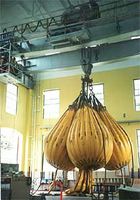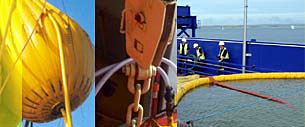TTAB Affirms 2(e)(1) Refusal Of "WATER WEIGHTS," But Finds Secondary Meaning
The TTAB affirmed a Section 2(e)(1) refusal to register the mark WATER WEIGHTS, finding it to be merely descriptive of Applicant's load testing services and systems. In re Imes Group Ltd., Serial No. 75622598 (January 25, 2005) [not citable]. However, the Board reversed the Examining Attorney's finding that Applicant's evidence was insufficient to establish acquired distinctiveness.

The Board noted that Applicant Imes Group Limited describes its product as consisting of "a strong bag that is filled with water and used, individually or in groups of bags, as weight to test the load of various types of heavy equipment." Moreover, the Board noted that the "main feature of applicant's services is the use of these water bags to conduct load testing for customers." Third-party websites showed descriptive use of the term "water-weight." Thus the Board found that WATER WEIGHTS "immediately describes, without conjecture or speculation, a significant feature or function of applicant's goods and services."
As to secondary meaning, the Board observed that in Section 2(f), Congress left it to the PTO and the courts to decide upon "the exact degree of proof necessary to qualify a mark for registration." Here, Applicant's evidence consisted of two declarations and numerous letters from customers. The declarations indicated that the mark has been in substantially exclusive use since 1986, and that the goods and services "are expensive and are advertised to, and bought by, a very specific group of purchasers who are likely to be exercising great care." Applicant spent more than $400,000 in the USA in advertising and marketing during the period 1998-2002, with sales of $8.5 M. And a "significant number of non-form letters from its customers attest[ed] to their recognition of WATER WEIGHTS as a trademark of applicant." The Board found this evidence sufficient to establish secondary meaning.

One disconcerting aspect of the Board's decision is its statements that the Examining Attorney "refused registration under Section 2(f)," and it ruling reversing the "refusal under Section 2(f)." Section 2(f) does not provide a ground for refusal to register. It provides a means of overcoming refusals to register founded upon other subsections of Section 2. Thus there is no such thing as a "refusal to register under Section 2(f)." See In re Capital Promotion Counselors, Inc., 219 USPQ 916, 917 (TTAB 1983) at n. 2. The proper refusal should be that Applicant’s evidence is insufficient to demonstrate that the mark has acquired distinctiveness, and therefore registration is refused under Section 2(e)(1), 2(e)(2), or Section 2(e)(4), as applicable.
Text ©John L. Welch 2005. All Rights Reserved.




0 Comments:
Post a Comment
<< Home